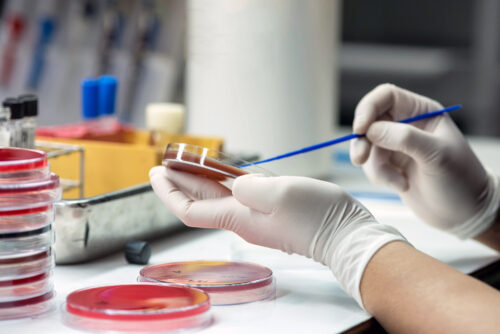There are several common medication therapies during which the patient’s labs must be monitored. Nurse Practitioners working in primary care settings will want to be aware of these lab tests to best serve their patients and avoid adverse drug effects. In this article, we will discuss the most frequently prescribed medications and their associated lab tests.
Related online course: Laboratory Monitoring During Drug Therapy
Why is lab monitoring during common medication therapies important?
Here are four main reasons why certain medications require lab monitoring:
- To watch out for potential ill effects from medication use. It is important to check a patient’s liver function during the use of certain medications that can negatively impact liver function, including statins or a TZD. Nurse practitioners should remember to check hepatic enzymes when the patient is starting a new drug, in order to establish a baseline, but further monitoring is no longer required.
- To see if an underlying or comorbid disease has worsened. If a patient has an underlying kidney disease, lab monitoring is essential during medication use. Checking a patient’s renal function will ensure that comorbid diseases are not exacerbated by prescription drugs. One common medication to consider in this case is Metformin. This medication is often misconstrued as being nephrotoxic, which it is not. However, if someone has impaired kidney function, they are at high risk of further kidney damage from Metformin.
- To check NTI drug levels. Any medication with a narrow therapeutic index (NTI), meaning the therapeutic and toxic levels are very close to each other, must be monitored carefully. Nurse practitioners are advised to check drug levels for NTI drugs, such as theophylline and lithium, once every three months or more often with dose changes to make sure levels remain within this narrow window.
- To confirm desired drug effect. In some cases, nurse practitioners will want to check that the medication is functioning as it should. Rather than check a patient’s serum medication level, you can directly test the affected physiology. For example, if a patient is being treated for hypothyroidism, a nurse practitioner would not check the drug level but rather check the patient’s TSH levels. Similarly, if a patient is on Warfarin, nurse practitioners are advised to monitor INR levels.
What labs need to be checked for patients on ACE Inhibitors or ARB medications?
Angiotensin-converting enzyme (ACE) inhibitors and angiotensin II receptor blockers (ARBs) are common medication therapies prescribed to lower blood pressure. Because ACE inhibitors and ARB medications are vasodilators, they can reduce kidney filtration and cause problems for patients with kidney disease.
It is common for these medications to cause a temporary bump in creatinine levels. Above a certain level, however, it is dangerous and requires lowering or stopping the medication. Additionally, ACE inhibitors and ARB medications are potassium-sparing medications. As a result, they promote the excretion of sodium and retention of potassium.
Therefore, they can cause dangerously high potassium levels, or hyperkalemia, as well as dangerously low sodium levels, or hyponatremia. In a patient with chronic kidney disease (CKD), it is important for nurse practitioners to remember to monitor serum creatinine (sCr), potassium, and sodium levels.
Tips for Nurse Practitioners checking sCr and potassium levels
- Nurse practitioners should check levels at the start of the medication usage to establish a baseline. They should check again within one to two weeks of increasing the dosage. After that, it is common to recheck every six months, or as dictated by comorbidities.
- It is acceptable to continue the medication if the sCr increase is less than 30% and if the level stabilizes and moves back to baseline as the patient’s blood pressure improves. Remember, this may take months.
- For all potassium-sparing medications, it is important to check a patient’s hydration status. Over-diuresis or underhydration is the most common reason for hyperkalemia in ACEI or ARB use.
What labs need to be checked for patients on SSRIs?
Selective Serotonin Reuptake Inhibitors, or SSRIs, are a class of medications commonly prescribed to treat depression and anxiety. These medications require that an elderly patient’s serum sodium levels be checked annually, establish a baseline and check with drug increases.
Checking serum sodium levels in older adults is essential because SSRIs may cause hyponatremia. This is due to the medication’s potential effect of blocking the body’s ability to regulate sodium and fluid levels. Because older adults are already vulnerable due to decreased ability to regulate fluids, nurse practitioners need to keep an eye on serum sodium levels in older patients on SSRIs.
How often should serum medication levels be checked in patients on antiepileptic drugs (AEDs)?
Many anticonvulsant medications, while less commonly prescribed, are high on the list of medications that need to be monitored with labs. This is because many anticonvulsants have a narrow therapeutic index. A patient’s serum medication levels should be checked on initial dose titration, to establish target levels, and every six months thereafter. Additionally, antiepileptic drug levels should be checked for:
- Disease or physiological changes
- Suspected toxicity
- Starting or stopping an interacting drug
If a check is needed, it should be checked at the trough level, just before the next dose is due. However, if toxicity is suspected, the drug level should be checked at its suspected peak.
What labs need to be checked for patients on antipsychotic medications?
Because second-generation antipsychotics worsen insulin resistance, they can cause weight gain, increased diabetes risk, and dyslipidemia. When a patient is taking antipsychotics, it is important to check their blood sugar and lipid profile. Triglycerides tend to go up, so nurse practitioners need to monitor these levels, as well as serum glucose, to better understand the patient’s metabolic risk. These levels should be checked initially for baseline, again at twelve weeks, and then annually.
What labs need to be checked for patients on statins?
Statins are a group of common medication therapies prescribed to patients to help lower cholesterol. While it is no longer recommended to monitor liver function tests routinely while on statin therapy, they should be performed before starting statin therapy to assess for undiagnosed liver disease. After that, there is no indication for routine monitoring. Of course, if a patient develops muscle pain after starting statin therapy, creatine kinase (CK) can assess for myositis and muscle breakdown.






